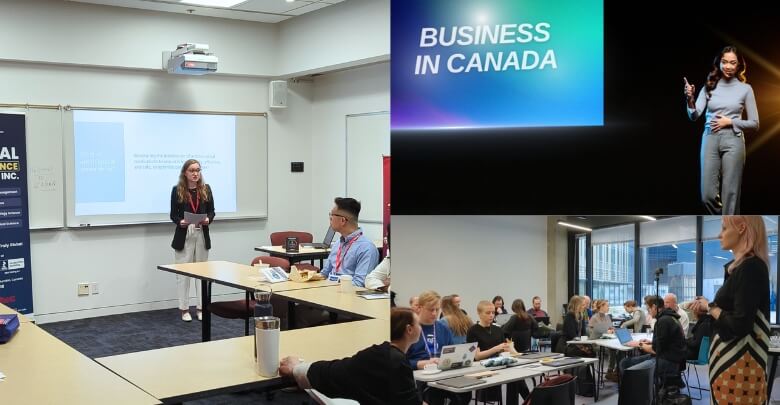A Canada conference visa allows international travelers to attend business events, seminars, and conferences in Canada. This visa is essential for professionals who need to enter the country for short-term purposes related to work or industry events. But, how long is Canada conference visa?
Typically, it is issued for up to six months. However, the actual duration depends on the immigration officer’s assessment of the applicant’s travel plans and reason for visiting. The officer may shorten or maintain the visa length based on individual circumstances.
To better understand the requirements, application process, and tips for a successful visa application, continue reading the rest of the article for detailed guidance.
Canadian Conference Visa – Why Does it Matter?
Attending conferences in Canada can be an excellent opportunity to network, learn, and expand professional knowledge. But without a valid visa, entering the country is impossible. That’s why understanding the Canadian conference visa is crucial for smooth travel and participation.
A Canadian conference visa allows you to attend business events and seminars for a limited time. It’s important to know how long you can stay. The conference visa duration in Canada depends on your application and the officer’s decision.
Knowing the visa requirements ensures you plan your trip without unexpected issues. Applying early gives you time to gather the needed documents. A well-prepared application can help avoid delays or rejections, allowing you to focus on the event itself.
How Long is Canada Conference Visa?
A Canada conference visa allows you to visit Canada for business or professional events. Typically, the visa is valid for up to six months. However, the exact duration depends on various factors, as determined by Canadian immigration authorities.
Purpose of the Visit
The purpose of your visit plays a key role in determining the visa’s length. If attending a short-term event, the officer may issue a shorter stay. Longer stays may be granted if additional business meetings or activities are planned.
Clearly explaining your purpose helps immigration assess the time required for your visit. Applicants with detailed plans are more likely to receive longer visa durations. A lack of clear purpose can result in a shorter stay being granted.
Travel Plans
Your travel itinerary is another factor immigration considers when issuing a conference visa. Showing detailed travel plans gives officers insight into your intended duration in Canada. A well-organized itinerary often supports a longer stay.
It’s important to provide information on your arrival and departure dates. Offering flexibility with travel plans can sometimes work in your favor. However, unclear or incomplete plans might result in a shorter visa duration.
Previous Travel History
Your past travel record can influence how long your Canadian conference visa will last. Frequent travel to Canada or other countries may boost your chances of getting a longer stay. A clean and responsible travel history reflects positively.
Immigration authorities tend to trust applicants with consistent records of returning home on time. If you’ve previously overstayed in any country, it could reduce your chances. This highlights the importance of adhering to visa rules in past travels.
Sponsorship or Invitation
An official conference invitation can significantly impact the length of your visa. A credible, professional organization sponsoring your visit strengthens your case. It shows Canadian authorities that your visit is legitimate and time-specific.
Attending a Canada conference with an invitation letter makes the process easier and often results in a favorable visa duration. Without sponsorship, it might be challenging to prove the necessity of a longer stay. Strong supporting documentation is always beneficial.
Health and Security Concerns
Health and security considerations can also affect how long your visa is granted. If an applicant has medical issues, the stay might be shortened. Similarly, security risks can lead to limited visa approvals.
It’s important to disclose any health conditions that might impact your visit. Providing all necessary health documentation can speed up the process. Failing to address these factors can result in visa delays or denials.
Eligibility Requirements for Canadian Conference Visa
Obtaining a visa to attend a business or economics conference in Canada involves meeting specific criteria set by the Canadian immigration authorities. Here are the essential eligibility requirements, detailed under distinct subheadings.
Proof of Invitation
An official invitation letter from the conference organizers is a pivotal requirement. This document should clearly outline the conference details, including dates, venue, and the attendee’s role. It establishes the purpose and legitimacy of the applicant’s planned visit to Canada, serving as a cornerstone for the visa application.
Financial Stability
Applicants must demonstrate they have sufficient funds to cover their stay in Canada. This includes accommodation, meals, transportation, and other living expenses. The authorities seek to ensure visitors can handle Canada’s resources, mandating proof of financial stability.
Travel Documents
A valid passport is a non-negotiable requirement for a Canadian Conference Visa. The passport should have an expiry date that extends at least six months beyond the planned departure date from Canada. Additionally, applicants might need to provide previous travel records, further reinforcing their credibility as travelers.
No Criminal Record
Canada requires visa applicants to undergo a background check to safeguard its national security. This process confirms that the applicant has no criminal record and poses no threat to Canadian society. Thus, obtaining police clearances from the countries where the applicant has lived significantly is essential.
Medical Examination
A medical examination may be mandatory depending on the applicant’s country of residence. This requirement ensures that the applicant poses no health risk to Canadians. It is particularly critical for applicants from countries with known health risks or issues.
Compliance with Immigration Regulations
Applicants must prove their intent to leave Canada after the conference. Evidence, such as a return ticket and a stable job in their home country, helps substantiate this claim. This ensures that applicants are likely to comply with Canadian immigration rules and regulations.
How to Apply for a Conference Visa in Canada?
Embarking on a journey to Canada for a conference requires proper planning and understanding of the visa application process. Below is a step-by-step guide to facilitate a smooth application for a Canadian Conference Visa.
Step 1: Gather Necessary Documents
Before starting the application, collect all essential documents. This includes your valid passport, conference invitation letter, proof of financial stability, and potential medical examination results. Organized documentation ensures an error-free application process.
Step 2: Complete the Application Form
Visit the official website of the Canadian immigration department. Here, you can find the designated form for a Conference Visa application. Fill it diligently, ensuring accuracy in every detail.
Step 3: Pay the Processing Fee
The visa application comes with a processing fee, payable online. Once paid, keep a receipt as proof, as you might need to present it later. It’s a crucial step, signifying your application’s official initiation.
Step 4: Submit Biometrics
Certain nationals need to provide biometrics as part of their application. Schedule an appointment at your nearest Visa Application Center (VAC). Attend on the specified date and complete the biometrics process.
Step 5: Attend an Interview
Not all applicants will be called for an interview. However, they will schedule one if the Canadian consulate requires further clarification. If you succeed in the interview, you can get your Canadian conference visa timely. Make sure to attend this interview, ensuring you carry all relevant documents with you.
Step 6: Wait for the Decision
After submission, your application undergoes a review process. Canadian authorities will evaluate your application against set criteria. Once a decision is made, you’ll be intimated about your visa status.
Step 7: Collect Your Visa
If approved, you will need to collect your visa stamp or e-visa. This may involve visiting the VAC or receiving an online notification. Ensure you have this documentation before traveling to Canada.
Tips to Speed up the Canadian Conference Visa Process
Applying for a Canadian conference visa can be time-sensitive, especially when your event is approaching. To avoid delays, it’s crucial to understand key strategies that can speed up the process. Below are eight tips to help you secure your visa faster.
- Submit Complete Documents Early: Filing your application with all necessary documents early can avoid processing delays. Incomplete applications often result in rejections or additional requirements.
- Provide a Clear Itinerary: A well-structured travel plan helps officers assess your visit quickly. Clear arrival and departure dates reduce processing time significantly.
- Obtain an Invitation Letter: Having a formal invitation letter from the conference sponsor strengthens your case. This document adds legitimacy to your visa application.
- Ensure Financial Proof is Strong: Demonstrating that you can financially support your stay speeds up the decision process. Insufficient funds may cause unnecessary delays or rejections.
- Use a Visa Consultant if Needed: Hiring a professional visa consultant can help you avoid errors. Their expertise can streamline your application and save valuable time.
- Apply for a Biometrics Appointment Quickly: If required, scheduling your biometrics appointment as soon as possible is essential. Delayed appointments can hold up the entire visa process.
- Check for Application Updates Regularly: Frequently checking your visa status online ensures you respond to any additional requests. Ignoring updates can cause unnecessary delays.
- Stay Informed on Visa Validity: Knowing the months of Canadian conference visa validity ensures you plan a suitable visit. Overstaying may negatively affect future visa approvals.
Bottom Lines
Understanding visa durations is crucial to ensuring seamless travel, especially for professional or academic commitments. Amidst a sea of queries, one often wonders, how long is Canada conference visa?
This is a pertinent question, given the numerous professionals and scholars looking to partake in Canadian conferences. The Canada Conference visa has been structured to cater to attendees of seminars, workshops, and related events.
The visa is valid for up to 6 months from its issue date. Such a timeframe ensures attendees can immerse in their events, network efficiently, and even indulge in leisure activities. Canada’s visa system provides a balanced stay, optimizing professional commitments and personal explorations.








